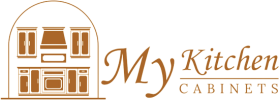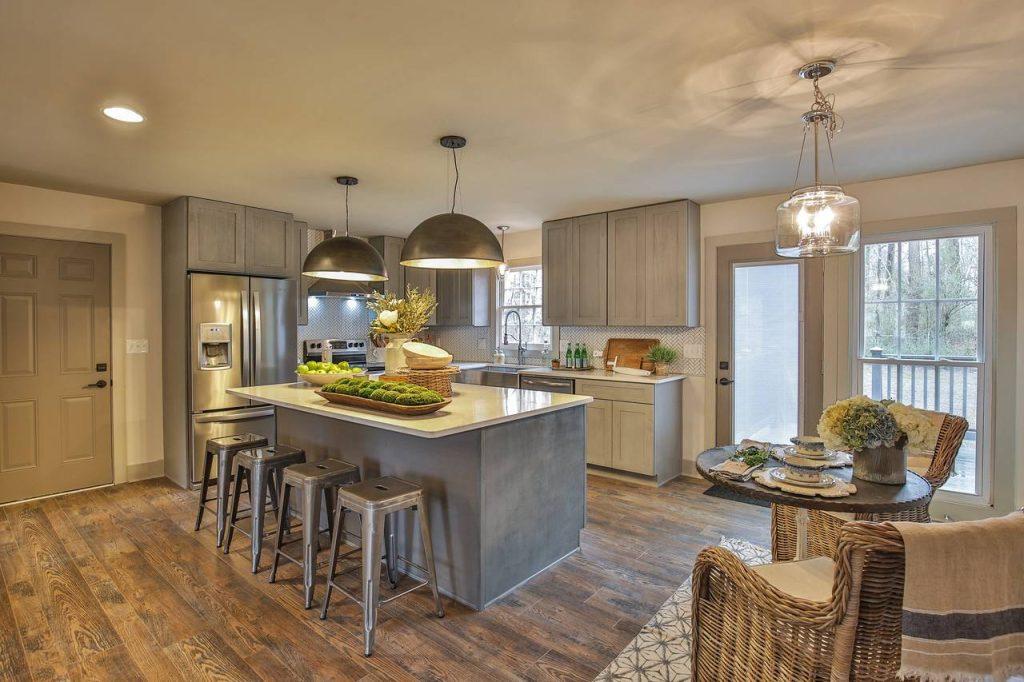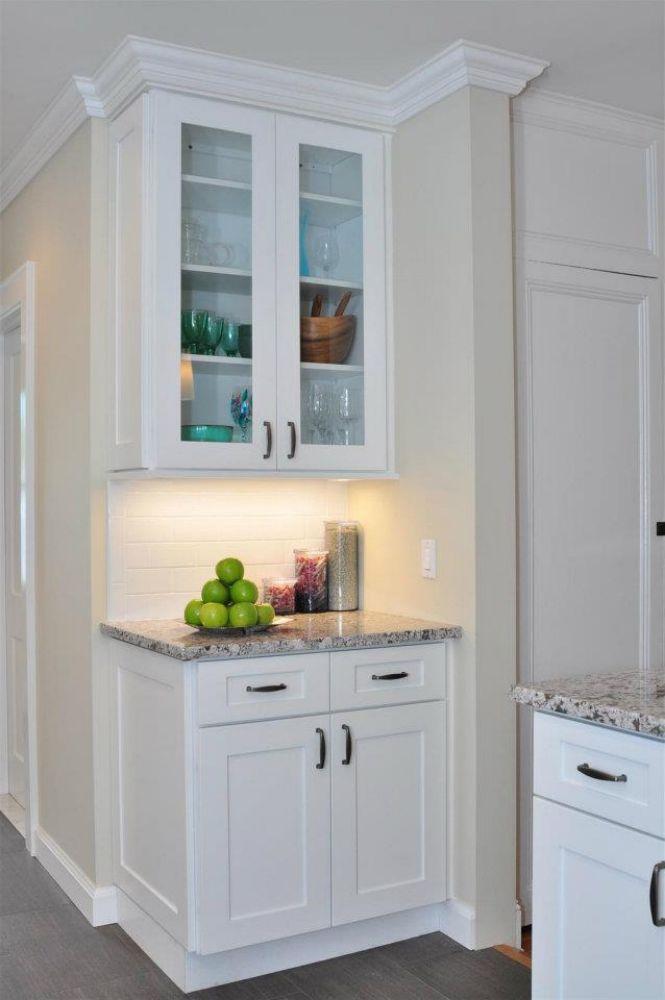Home Value & Kitchens: Stock vs. Custom Cabinets
Introduction
When it comes to home value and kitchen upgrades, one important consideration is the choice between stock and custom cabinets. Cabinets play a pivotal role in the functionality and aesthetics of your kitchen, and this decision can significantly impact your home’s overall value. In this comprehensive guide, we will address the ten most frequently asked questions about the choice between stock and custom cabinets, providing you with valuable insights to make an informed decision.
Question 1: What Are Stock Cabinets?
Stock cabinets are pre-made cabinets that come in standard sizes and designs. They are mass-produced and readily available in various home improvement stores. These cabinets are a cost-effective option and are ideal for homeowners looking for a budget-friendly kitchen renovation.
Advantages of Stock Cabinets:
- Affordability: Stock cabinets are generally more budget-friendly than custom options.
- Quick Installation: Since they are pre-made, stock cabinets can be installed relatively quickly.
- Wider Selection: Many styles and finishes are available to choose from.
Drawbacks of Stock Cabinets:
- Limited Customization: Limited options for customization compared to custom cabinets.
- Standard Sizes: May not fit perfectly in all kitchen spaces.
Question 2: What Are Custom Cabinets?
Custom cabinets are made-to-order cabinets designed to meet your specific requirements. They are built by skilled craftsmen and can be tailored to fit your kitchen’s unique dimensions and style preferences. While they are often more expensive than stock cabinets, the level of personalization they offer can significantly enhance your kitchen’s value.
Advantages of Custom Cabinets:
- Tailored to Your Space: Custom cabinets are built to fit your kitchen perfectly, maximizing storage and functionality.
- Endless Design Options: You have full control over materials, finishes, and design details.
- Premium Quality: Custom cabinets are typically constructed with higher-quality materials.
Drawbacks of Custom Cabinets:
- Higher Cost: Custom cabinets are usually more expensive due to their personalized nature.
- Longer Lead Times: The design and construction process may take longer.
Question 3: Do Custom Cabinets Increase Home Value More Than Stock Cabinets?
The impact of cabinets on home value varies depending on several factors, including the overall housing market, location, and the quality of cabinets chosen. In general, custom cabinets have the potential to increase home value more significantly than stock cabinets. Their superior craftsmanship, tailored fit, and high-end materials often appeal to homebuyers and can set your property apart.
Question 4: How Can I Maximize the Value of Stock Cabinets?
If you decide to go with stock cabinets to save on costs, there are still ways to maximize their value:
- Upgrade Hardware: Investing in high-quality cabinet hardware can give stock cabinets a more upscale appearance.
- Professional Installation: Ensure stock cabinets are installed by experienced professionals for a polished look.
- Quality Countertops: Pairing stock cabinets with quality countertops can enhance the overall kitchen aesthetic.
Question 5: Can I Mix Stock and Custom Cabinets?
Yes, you can mix stock and custom cabinets to balance cost and customization. For example, you can use custom cabinets for the kitchen island or specific design focal points, while using stock cabinets for the rest of the kitchen. This allows you to achieve a personalized look without breaking your budget.
Question 6: Are There Trends in Cabinet Design That Impact Home Value?
Cabinet design trends can indeed influence home value. In recent years, trends have leaned towards clean lines, minimalistic styles, and eco-friendly materials. Staying up-to-date with these trends when choosing your cabinet design can help increase your kitchen’s appeal to potential buyers.
Question 7: Are There Sustainable Options for Stock and Custom Cabinets?
Both stock and custom cabinets can be sourced from sustainable materials. Look for certifications like FSC (Forest Stewardship Council) when selecting cabinets to ensure they are environmentally responsible. Sustainable choices can appeal to eco-conscious homebuyers and positively impact your home’s value.
Question 8: How Can I Determine Which Cabinets Are Best for My Home?
Choosing between stock and custom cabinets depends on your budget, the level of personalization you desire, and your long-term goals for your home. Consider factors like your neighborhood’s housing market and your kitchen’s size and layout. Consulting with a professional designer or real estate agent can also provide valuable insights tailored to your specific situation.
Question 9: What Maintenance Is Required for Stock and Custom Cabinets?
Maintaining both stock and custom cabinets involves regular cleaning to prevent dirt and grime buildup. The type of finish and materials used will impact the cleaning process. Always follow manufacturer recommendations for care and cleaning to ensure the longevity of your cabinets and, consequently, your home’s value.
Question 10: Can I Upgrade Stock Cabinets Later?
Yes, you can upgrade stock cabinets later. If you choose stock cabinets initially but decide to add custom features or details, you can work with a carpenter or cabinetmaker to make modifications. This flexibility allows you to improve your kitchen’s functionality and aesthetics over time as your budget permits.
In conclusion, the choice between stock and custom cabinets plays a crucial role in determining your kitchen’s value and overall appeal to potential buyers. Consider your budget, customization preferences, and long-term goals for your home when making this important decision. By doing so, you can ensure that your kitchen renovation is an investment that enhances both your living experience and your property’s value.
Question 11: Can I Refinish Stock Cabinets to Improve Their Appearance?
Refinishing stock cabinets is a viable option if you want to enhance their appearance without the expense of custom cabinets. You can choose to repaint or re-stain the cabinets to give them a fresh look. This DIY project can be an affordable way to improve the aesthetics of your kitchen.
Question 12: Are There Any Tax Benefits to Choosing Custom Cabinets?
In some cases, there may be tax benefits associated with choosing custom cabinets. Depending on your location and the specifics of your kitchen renovation, you may be eligible for tax credits or deductions related to energy-efficient or sustainable materials used in custom cabinets. Consult with a tax professional to explore potential tax benefits.
Question 13: Can Cabinet Hardware Impact Home Value?
Yes, cabinet hardware can impact home value. Upgrading cabinet knobs, handles, and pulls to high-quality, stylish options can add a touch of luxury to your kitchen. Homebuyers often appreciate the attention to detail, and it can make your kitchen more appealing when it’s time to sell.
Question 14: How Do I Ensure My Custom Cabinets Are of High Quality?
To ensure your custom cabinets are of high quality, consider the following:
- Check References: Ask for references from the cabinet maker and inspect their previous work.
- Materials: Discuss the materials used, such as solid wood and dovetail joints.
- Warranty: Inquire about the warranty or guarantee offered for the cabinets.
- Quality Standards: Ensure the cabinet maker adheres to industry quality standards.
Question 15: What Impact Do Cabinet Colors Have on Home Value?
Cabinet colors can have a significant impact on home value. Neutral colors like white, gray, and beige tend to be timeless and appeal to a broader range of homebuyers. However, bold or unique colors can also work if they complement the overall kitchen design and aesthetics.
Question 16: Do Custom Cabinets Provide Better Storage Solutions?
Custom cabinets often provide better storage solutions compared to stock cabinets. They can be designed to maximize every inch of available space, including tricky corners and unusual layouts. This level of customization can lead to efficient and organized storage solutions, which can be a selling point for your home.
Question 17: What Are the Trends in Cabinet Materials?
Cabinet materials can significantly impact your kitchen’s aesthetics and home value. Currently, popular cabinet materials include hardwoods like oak, maple, and cherry. Additionally, sustainable and eco-friendly materials, such as bamboo and reclaimed wood, are gaining popularity due to their environmental appeal.
Question 18: Can I Recycle Old Cabinets During a Renovation?
Yes, you can recycle old cabinets during a renovation. Donating old cabinets to charities or organizations that specialize in salvaging building materials is an eco-friendly option. This not only helps the environment but can also be a tax-deductible donation, providing potential financial benefits.
Question 19: How Do I Maintain the Value of Custom Cabinets Over Time?
Maintaining the value of custom cabinets over time requires regular care and attention. Follow these tips:
- Regular Cleaning: Clean cabinets regularly to prevent dirt and grease buildup.
- Avoid Harsh Cleaners: Use mild, non-abrasive cleaners to protect the finish.
- Handle with Care: Treat cabinets gently to avoid scratches and dents.
Question 20: Can the Right Cabinet Layout Impact Resale Value?
The layout of your cabinets can indeed impact resale value. A well-thought-out and functional cabinet layout can make the kitchen more attractive to potential buyers. Consider factors like the work triangle (the arrangement of the sink, stove, and refrigerator) and ample storage space when planning your cabinet layout.
In summary, choosing between stock and custom cabinets is a significant decision that can influence your kitchen’s functionality, aesthetics, and home value. It’s essential to weigh the advantages and disadvantages of each option carefully and align your choice with your budget, design preferences, and long-term goals for your home. By making an informed decision, you can enhance both your living experience and your property’s appeal to potential buyers.
Question 21: What Role Do Cabinet Features Play in Home Value?
Cabinet features play a pivotal role in home value. Features such as soft-close hinges, pull-out drawers, and built-in organizational tools enhance convenience and functionality. These elements can make your kitchen more appealing to potential buyers who value modern and efficient spaces.
Question 22: Can I Add Custom Cabinets to an Existing Kitchen?
Yes, you can add custom cabinets to an existing kitchen. This is often done during kitchen remodels or renovations. Custom cabinets can be designed to seamlessly blend with your existing ones, creating a cohesive and upgraded look while improving your kitchen’s overall value.
Question 23: Should I Consider the Resale Value of My Home When Choosing Cabinets?
Considering the resale value of your home when choosing cabinets is a smart move. While your personal preferences are essential, selecting cabinets that have broad appeal can make your home more attractive to potential buyers. Neutral styles and high-quality materials are generally safe choices.
Question 24: Are There Financing Options for Custom Cabinets?
Yes, there are financing options for custom cabinets. Home improvement loans, home equity lines of credit (HELOCs), or personal loans can help you fund the purchase of custom cabinets. Explore different financing options to determine which one aligns with your budget and financial goals.
Question 25: Can I DIY Install Custom Cabinets to Save Money?
Installing custom cabinets yourself can save money, but it requires a high level of skill and expertise. Custom cabinets are often complex to install due to their precise measurements and customization. If you have experience in cabinetry and carpentry, it’s possible, but for most homeowners, hiring a professional installer is advisable to ensure a flawless outcome.
Conclusion
In this comprehensive guide, we’ve explored the essential questions surrounding the choice between stock and custom cabinets in the context of home value and kitchen upgrades. Cabinets are not just functional storage; they are a focal point of your kitchen’s design and can significantly impact your home’s overall worth.
When making the decision between stock and custom cabinets, it’s crucial to consider your budget, design preferences, and long-term goals for your home. Each option has its advantages and drawbacks, and the right choice depends on your unique circumstances.
Remember that your kitchen is one of the most frequented spaces in your home, and investing in quality cabinets can enhance your daily living experience while potentially increasing the resale value of your property. Whether you opt for the affordability of stock cabinets or the personalized luxury of custom cabinets, your choice should align with your vision for the heart of your home.
Question 26: What Are the Latest Technological Advancements in Kitchen Cabinets?
In recent years, kitchen cabinet technology has advanced significantly. Some of the latest innovations include:
- Smart Cabinets: These feature built-in charging stations, LED lighting, and even voice-activated controls.
- Soft-Close Technology: Cabinets with soft-close mechanisms prevent slamming and reduce wear and tear.
- Integrated Appliances: Cabinets can now accommodate built-in appliances seamlessly for a sleek and modern look.
Question 27: Do Custom Cabinets Offer Better Durability?
Custom cabinets often offer better durability than stock cabinets due to the choice of materials and craftsmanship. You have the flexibility to select high-quality woods and finishes, ensuring that your cabinets can withstand the test of time. This durability can contribute positively to your home’s value.
Question 28: Can I Add Custom Features to Stock Cabinets?
While stock cabinets may come with limitations in terms of customization, you can still add some custom features to enhance their functionality. This might include adding pull-out trays, dividers, or additional shelving to make the most of the available space.
Question 29: What Are the Long-Term Maintenance Costs of Stock vs. Custom Cabinets?
Consider the long-term maintenance costs when choosing between stock and custom cabinets. Stock cabinets may have lower upfront costs, but custom cabinets, with their higher-quality materials, can be more resistant to wear and tear, potentially reducing maintenance expenses over time.
Question 30: Can I Change Cabinet Styles Without Replacing Them?
If you’re looking to update your kitchen’s style without replacing the cabinets entirely, you can consider cabinet refacing. This involves replacing cabinet doors, drawer fronts, and hardware while retaining the existing cabinet frames. It’s a cost-effective way to give your kitchen a fresh look without the expense of new cabinets.
Expanding Your Kitchen’s Appeal and Value
Your choice between stock and custom cabinets should align with your vision for your kitchen and your long-term goals for your home. Both options have their merits, and there’s no one-size-fits-all answer. It’s crucial to strike a balance between your budget and your desire for customization and durability.
Ultimately, the kitchen is the heart of your home, and it’s where you spend a significant amount of time. Investing in quality cabinets, whether stock or custom, can enhance your daily living experience and potentially increase the resale value of your property.
As you navigate this important decision, consider consulting with kitchen design professionals or real estate experts who can provide tailored advice based on your specific situation. By doing so, you can ensure that your kitchen renovation not only meets your immediate needs but also serves as a valuable investment in your home’s future.


